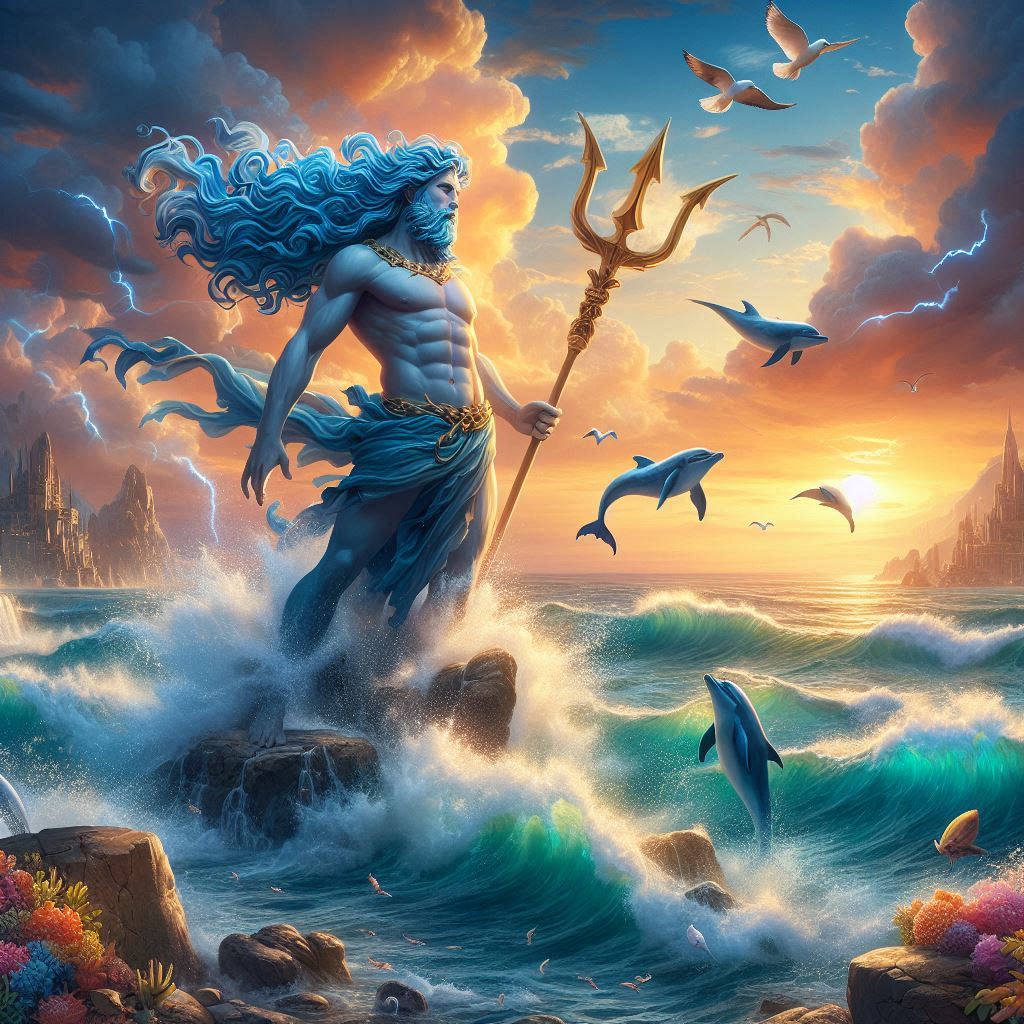
POSEIDON
Biography of Poseidon
Poseidon was one of the twelve Olympian gods in Greek mythology and ruled the seas. He was a son of the Titans Kronos and Rhea, and a brother of Zeus and Hades. While Zeus ruled the heavens and Hades ruled the underworld, Poseidon was given dominion over the sea.
Poseidon is often depicted as a powerful, bearded figure with a trident, a symbol of his power over the sea and earthquakes. With his trident he could cause storms and earthquakes. He often traveled across the seas in a chariot pulled by seahorses or dolphins.
Family and descendants: Poseidon had many love affairs with both gods and mortal women. His most important partner was the sea nymph Amphitrite, with whom he had several children, including Triton, a god of the seas. Poseidon's children were often powerful and sometimes monstrous figures, such as the one-eyed giants Cyclops and the giant Antaios.
Important myths: Poseidon played a role in many well-known Greek myths. One of the most famous stories is his rivalry with Athena for the rule of the city of Athens. He created a source of salt water by striking the Acropolis with his trident, while Athena planted an olive tree. The inhabitants eventually chose Athena's gift and named the city after her. This conflict shows Poseidon's fiery and vengeful nature.
Poseidon was also a patron god of horses and was responsible for the creation of the first horse. He had strong ties with the navigators and fishermen, who often made sacrifices to win his favor and ask for protection during their voyages.
Why are people still interested in Poseidon today?
Poseidon remains a fascinating figure for several reasons:
1. Cultural Heritage: Greek mythology is part of the cultural heritage of the Western world. Stories about gods like Poseidon offer insight into ancient Greek society, their values, and their interactions with nature.
2. Symbolism and Archetypes: Poseidon represents universal archetypes such as the wild and unpredictable forces of nature. His character and stories still resonate with contemporary themes of power, revenge, and protection.
3. Popular Culture: Poseidon appears in various forms in modern literature, movies, TV series, and video games. Well-known examples are the "Percy Jackson" book series, in which he plays an important role as the father of the protagonist.
4. Personal Meaning: For some, Poseidon has personal or spiritual significance. People may be drawn to the symbolism of the sea, water, and the forces of nature that Poseidon represents.
PSEIDON
-
POSEIDON White 15oz Stainless Steel Travel Mug
Regular price €38,80Regular priceUnit price / per -
POSEIDON White 15oz Ceramic Mug
Regular price €18,10Regular priceUnit price / per -
POSEIDON Slim Protective Samsung case
Regular price €26,44Regular priceUnit price / per -
POSEIDON Slim Protective IPhone case
Regular price €26,44Regular priceUnit price / per -
POSEIDON Great Canvas Art
Regular price From €50,46Regular priceUnit price / per -
POSEIDON Great Fine Art Poster
Regular price From €8,24Regular priceUnit price / per -
POSEIDON White 12oz Enamel Mug
Regular price €21,98Regular priceUnit price / per -
POSEIDON Classic Unisex Pullover Hoodie | Gildan® 18500
Regular price From €58,64Regular priceUnit price / per -
POSEIDON Premium Unisex Crewneck T-shirt | Bella + Canvas 3001
Regular price From €40,38Regular priceUnit price / per









